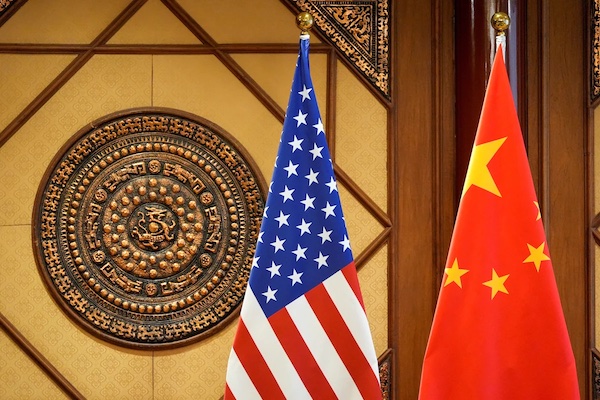In a cautious step toward easing an intensifying trade war, Chinese Vice Premier He Lifeng met with U.S. Treasury Secretary Scott Bessent on Saturday, marking the first direct talks between the two sides amid spiraling tariffs and mounting global economic instability.
The discussions are being held in Geneva following weeks of escalating hostilities that have pushed tariffs on bilateral imports well beyond 100%. The high-level meeting was still in progress late Saturday afternoon and is widely expected to extend into Sunday.
While the exact location of the negotiations was not officially disclosed, eyewitnesses reported both delegations returned to the Swiss ambassador’s residence in Cologny after a lunch break. The secluded villa, set in a private park with views over Lake Geneva, had hosted a two-hour morning session.
Earlier in the day, U.S. officials including Bessent and Trade Representative Jamieson Greer appeared upbeat as they left their hotel en route to the talks, donning red ties and American flag pins. Bessent did not make any comments to the press. Meanwhile, vans carrying the Chinese delegation departed their lakeside hotel, navigating through Geneva’s streets as marathon runners prepared nearby in the spring sunshine.
The dispute has rattled global supply chains, rocked financial markets, and raised concerns of a looming worldwide economic slump. Washington’s stance centers on narrowing its trade deficit with China and encouraging Beijing to abandon what it sees as a state-driven economic model—an overhaul that would demand significant political reform.
Beijing, in contrast, has accused the U.S. of meddling in its affairs. It is calling for clearer American demands, a rollback of punitive tariffs, and recognition of China as a global equal.
“China’s determination to safeguard its national development interests is unshakeable,” said Chinese state media outlet Xinhua on Saturday, emphasizing its commitment to upholding global trade order and fairness.
Expectations for a breakthrough remain low. Neither side wants to appear weakened amid mutual suspicion. On Friday, U.S. President Donald Trump floated a new tariff figure of 80% on Chinese goods, down from the 145% rates currently in place. He also claimed that China had initiated the Geneva talks—a statement Beijing disputed, insisting it was the U.S. that made the request.
China, meanwhile, is thought to be seeking the same temporary tariff reprieve that Washington has offered to other trading partners. Investors would view any signs of progress—such as reductions in tariffs or plans for further dialogue—as a positive development.
Swiss Economy Minister Guy Parmelin, who met with both delegations on Friday, described the meeting itself as a “success.” He noted that the talks could extend into Sunday or even Monday, depending on how negotiations proceed.
Switzerland played a behind-the-scenes role in arranging the discussions, following recent diplomatic engagements with both Beijing and Washington.
Vice Premier He is also expected to meet World Trade Organization Director-General Ngozi Okonjo-Iweala, according to the WTO. She has expressed support for the dialogue, urging both economic powers to maintain ongoing communication to reduce tensions.
Since entering office in January, Trump has dramatically raised tariffs on Chinese imports, citing grievances over trade practices and accusing Beijing of failing to curb exports of fentanyl precursors. In response, China imposed 125% retaliatory tariffs and vowed to resist pressure from what it called “imperialists” and bullies.




